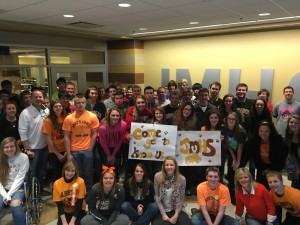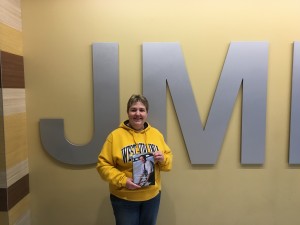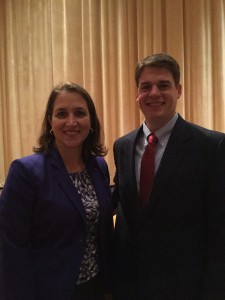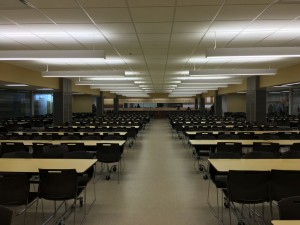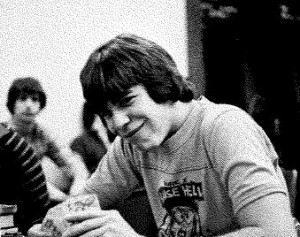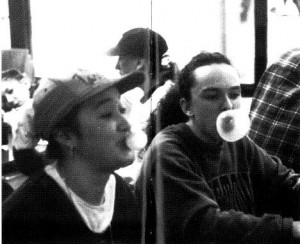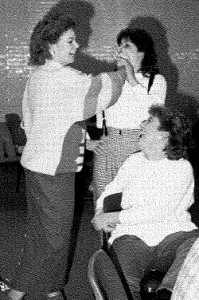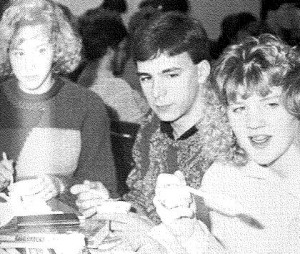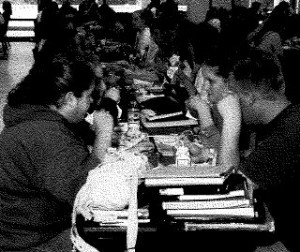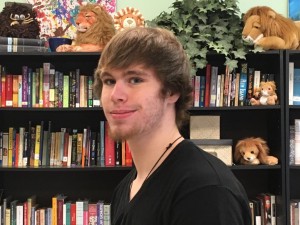Welcome to the John Marshall High School blog.
Contributors will include Administration, Faculty, and Students.
After much discussion with students, teachers, administrators, parents, and community members, we have identified two growing problems in our high school. The first is that our students do not seem to have adequate avenues to have their voices heard. One of our Language Arts teachers, Jonna Kuskey, wrote an outstanding article for the “School Bells” section of the newspaper and made a simple, but profound recommendation to classroom teachers….ASK YOUR STUDENTS! This led to a great discussion as to why we don’t ask students their opinion on other educational-related topics. The second problem – the growing trend toward the depersonalization of schools – is one we have identified and have been steadily working to improve. Several factors have led to the creation of schools that aren’t as personal as they once were. At JMHS, for example, we are a product of consolidation, which can naturally make schools less personal. Consolidated schools offer students so many resources and advantages. Extensive course catalogs, multiple educational pathways, top-notch facilities, and real-world social dynamics are just a few. However, some students can get lost in the myriad of choices. I believe the best combination is a big school with a small school feel. We pride ourselves in creating that culture at JMHS and will continue to do so. More specifically, we want our community to become acquainted with our teachers and students.
In order to accomplish our goal, we have created the John Marshall High School Blog. In our blog you will hear from students and staff on a variety of topics. Like every high school, we have so many intelligent, interesting, and creative people, and we want to share their thoughts, experiences, and insights with the larger community. We believe our blog will generate several positive outcomes. The most significant outcome we are anticipating is personalizing our school. Our community will have the ability to learn more about our students, staff, and programming. Of course, we will also learn the thoughts of the community through the comments and feedback we hope to receive. Another positive outcome of the blog is providing our students the ability to articulate their thoughts to an audience. Writing for the classroom is important, but so is learning to write for a larger, specific audience. Because our blog exists for a real purpose and not for a grade, students who volunteer to publish their writing will naturally take this experience more seriously than the everyday assignment.
For the past 20 years, I’ve had the pleasure of waking up every morning and reporting to work at a public school. I can’t overstate how gratifying an experience this has been. Schools are such all-encompassing shells. Within their walls, we encounter such a wide variety of people and experiences that shape both individual students and entire communities. Some days I get to witness students deal with and overcome their personal struggles or watch them achieve their personal goals. Sometimes I’m the person imparting my thoughts to help them in their quests; other times, I watch teachers and counselors work their magic. I have the privilege of helping and watching people transform themselves and their community. Unfortunately, we lost a student this summer, and our students have teamed together to not only help memorialize this wonderful friend but also to make a difference in the areas of cancer research and awareness in her name. In the same time frame, I attended a benefit for Mark Nardone (who happens to be one of my favorite people on earth) and watched an entire community come together. Schools breed these kind of individual and group efforts. There are an endless number of interesting and inspirational stories that occur within our little world, and we plan on sharing them on a regular basis. Hopefully, this will go towards alleviating the aforementioned depersonalization – allowing the community to see us in a much more personal light, while encouraging expression among our students and staff.
When I got the call as I was waiting in line for a concert in Pittsburgh, I had no idea how much one piece of information could change my life. Like a pebble tossed into a pond, what happened sent a ripple of effects. I was informed one of my closest friends, Abby Frohnapfel, had been diagnosed with acute myeloid leukemia. Hearing the news shocked me to the core. Abby had been in and out of the hospital for tests and fainted during one visit to Reynolds Memorial Hospital, resulting in an ambulance ride to Pittsburgh Children’s Hospital. Her diagnosis was sudden and surprising, but the cancer was detected early, and according to her doctors, was very treatable.
Once the news spread, my friends and I immediately wanted to help. We started Abby’s Army to raise money to help her family pay for her treatment. With the combined costs of medical expenses, gas money, and the price of eating out in a bigger city, we knew the situation would be expensive. The best gift we could give to her, though, was our time, so we visited Abby as much as possible.
When we first visited in May, her entire face lit up. We brought books and birthday cards. We traded goofy stories from driver's license tests to math teachers. When we asked how she was doing, she simply replied, "Tired." We knew Abby was downplaying her situation just so we wouldn’t worry. Despite it all, Abby still laughed her same, great belly laugh when Billy Fox launched into grave detail about his driver’s test and when Visakha Turner and Jacob Nelson updated her on the gossip. She told us about seeing the fireworks from the Pirates’ game outside of her hospital window. Abby wasn’t going to let her diagnosis get her down. She hated hugs but still agreed to some before we left that day. Her extremely supportive and loving family was also there. Her mother, Brenda, thanked us all for coming and let us know Abby had really been looking forward to our visit. Our time with Abby inspired us to raise as much money as we could to help her and her family.
In the end, Abby’s Army raised over $1,200 dollars for Abby in two weeks. I was amazed by the commitment and kindness others showed. Students who had never spoken to me before gave generous donations and promised to send prayers for Abby and her family. We saw an entire school come together for one bright, intelligent, kind-hearted girl who was fighting with absolute, unfaltering bravery.
During our second trip to visit Abby, we became keenly aware of her struggle and the true gravity of her situation. Once happy and energetic, by mid-July she was tired and frail. It was extremely hard to watch a good friend go through something so serious. We were now seeing the true, ugly effects of cancer, and it was devastating. Abby was still hopeful and never, ever gave up. She still cracked jokes, smiled, and listened to all our crazy stories. Joseph Lucey, Shelby Howard, Abby and I talked like we always had before. We said our goodbyes, oblivious to the tragedy that would soon happen.
Abby kept in contact with us through text, and we talked about anything and everything, except for her cancer. Her situation did not define her; Abby was still Abby, who loved her pigs, history, and books. She had her entire future ahead of her, and this was just a detour in life’s grand scheme. Despite it all, she never once complained. She had always been an independent, fiercely devoted girl who could do anything she set her mind to, and her fight just proved it further.
One night after driving back from school shopping with Megan Pulver and Shelby Howard, I received a call from Emily Yoho. She asked me what I knew about Abby since she had seen something peculiar on Facebook. I told her what I knew: the cancer had gone to her spine, but she was still stable. Emily called me back after Facebook messaging a relative of Abby’s. Abby had passed away. Nothing had ever hit me so hard. A lead weight had been dropped on top of my stomach. I told Megan and Shelby. My mom tried to console us, but we were in shock. None of us ever thought it would come to this; the cancer was found early, and it was supposed to be very treatable. On the long ride home, I thought of the memories we had shared with her in the past few years. I remembered us singing along to the Spice Girls in Spanish and complaining about boys. Digesting news like that is impossible because it doesn’t feel real. Abby was so young, younger than I, and her life had been cut short.
The days that followed were extremely difficult, but we relied on our circle of friends for support and comfort. We stood side by side through the memorial, the procession, and the burial. Our emotions shifted from shock, to denial, to anger, to sadness, to numbness, and back around again. None of us were prepared to lose such a close friend. She was the heart of our group; she embodied all the greatest traits we hoped to portray.
Abby affected us each in different ways. Her personality enhanced ours in a way because she made us feel comfortable enough to be ourselves. I cannot speak on behalf of our entire group of friends, but I know Abby made me feel inspired to achieve what I wanted. She never deterred me from my aspirations; in fact, she encouraged me with great enthusiasm and pride. Her belief in others always made them believe in themselves.
It’s hard to come to terms with a loss this severe at such a young age. The injustice of the situation can bear down on me at any given moment on any given day. Not a single day goes by where I do not think of Abby. I miss her more and more every day. It still feels like she could walk into our class and sit down just like usual. A valuable member of our group was lost on August 6, 2015, but we will never forget her and the positive effect she had on all of us. We will continue to run Abby’s Army and raise money to help other students who are struggling with life-threatening illnesses. Along with that, we want to make every day count. Losing Abby was a horrific tragedy that unfortunately made us all intensely aware of how short life can be. The proper way to live life is to live it as Abby would want us. She was friends with all kinds of people with different backgrounds and personalities. Her ambition was unparalleled; she would stop at nothing until she got where she needed to be. Abby was the person I want to be. Her personality was the first pebble in the pond that started a chain reaction of ripples, affecting us all uniquely. Until we meet again, I’m doing my best to keep making her proud of me every single day.
I had a “passion for teaching,” and all the credible education experts said teachers with a passion for the profession would be a success. Well, I exuded passion for English composition, so I was going to be a smashing success, a stupendous teacher. It didn’t quite work out that way. Who knew the majority of my students didn’t love reading and writing as much as I did? (Shock!) Students didn’t want to do classwork or homework. (Gasp!) But I was passionate for teaching! I gave stellar lectures and fancy PowerPoints. I bounced around the class explaining how much fun it was to write. It wasn’t working.
In my second year, a freshman put my passion to the test. He didn’t complete assignments, came to class unprepared, and didn’t pay attention. Out of frustration, I moved him to a seat beside my desk, made him repeat directions back to me, watched as he wrote down assignments, and kept him on task during class. By the end of the year, he earned a passing grade, not great, but passing. Three years later, he entered my English class as a senior. Would he be happy to have me hounding him every day during his senior year?
“Are you kidding? Yes!” he said.
What? Did he remember his freshman year? He did.
“I liked that you pushed me. You didn’t give up on me. You cared.”
He taught me a valuable lesson—great teachers don’t have a passion for teaching, they have a passion for helping students succeed. Epiphany! I was so focused on what I needed to teach, I wasn’t focused on what the students needed from me to learn. From that point forward, I stopped telling students what they had to learn and started asking students how I could help them learn.
Now, at the beginning of every school year, I ask students that question. Their answers become my job description. Here is my current job description, written by this year’s students on August 27:
- Care about us, and help us be better, both inside and outside the classroom.
- Be positive; love what you do, and love being with us.
- Listen to us; be open-minded and supportive.
- See how you teach from a students’ perspective, not a teacher’s perspective
- Be honest about what we do well and not so well.
- Remain patient with us even when we are difficult.
- Have a sense of humor and laugh with us.
- Force us out of our comfort zone.
- Help us outside of class.
- Never give us the answers; help us find them for ourselves.
- Be tough; don’t let us walk all over you.
- Explain assignments well and remind us of due dates.
- Assign homework days in advance, so we can schedule it into our busy lives.
- Give more than the bare minimum.
- Teach subject material in a variety of ways.
- Make class interactive; we should get to talk and work more than we listen.
- Understand your class is not the only class we have
- Grade and return homework in a timely manner
- Answer lots and lots and lots of student questions
- Be reasonable about grades; one missed assignment shouldn’t drop our semester grade by a letter.
- Be on time; come prepared; stay on task; remain organized, and make students do the same.
A pretty impressive and insightful list of duties, I must say, and my intention is to not just meet, but exceed their expectations, just like I want them to exceed my expectations. Throughout the year, I ask students to assess my performance, and they give me examples of what I did well and not so well, just as I do with them. The students are no longer passive participants but partners in the learning process. Sometimes they are the teachers, and I am the student. Together, we become successful.
Who knew one little question on the first day of school could make all the difference?
Apparently it's a rarity-- the friendships we have now will be short-lived -- at least that's what we're told. Sad but true. Right? We make friends; we love friends. We lose friends, it's part of life. Generally, the separation isn’t anyone’s fault. It just happens, you know? People grow apart. Teenagers are at an age of uncertainty. No other age group encounters the kind of change we do. Consequently, we’re used to making new friends. We learn to deal with it. BUT, if we’re truly lucky, we find a friendship that lasts through high school, perhaps college, and maybe, just maybe, life.
We won't find these best friends anywhere. They aren’t the ones who just ask for homework. They aren’t the ones we just see in class. They aren’t the ones that just wave to us in the hallway. They’re the ones who skip school with us, or for me, the one who won’t let me skip school. They’re the ones who eat lunch with us every day, even if that means waking up to drive to Burger King on the weekend. They’re the ones who help us keep our schedules straight, even if they can’t keep track of their own. These friends, through thick and thin, place us above all else.
What's even rarer is finding this friend early. I met my best friend in kindergarten. We spent all of elementary school together. We grew up together. We ran the lane together. And when my best friend's life changed forever, so did mine. I was hurt just as much; I cried just as much, if not more. It's a unique type of sadness, more than sympathy. I wanted to help, but there was nothing I could do. And that sort of helplessness ate away at me for a while. But, we made it through-- together-- the same way we started. Ten years later, not much has changed. And I'm sure, as with all of us who have found that best friend, nothing is going to change. We watch out for each other.
We shouldn't take any of this for granted because college comes fast. We may never see these friends again, at least no more often than the occasional “Let’s get coffee and catch up.”
So, enjoy spending time with your best friend while you can. Go to a concert. Hang out on the weekend together. Meet for breakfast. Buy those stupid doughnuts already. More than anything else, let your best friend know how much he or she means to you. Tell your friend. Right now. Go and find him or her. Because who knows? We may be losing our friends faster than we think--as I said, we are living the age of change. We will leave school and maybe go our separate ways. Don't waste these few precious months before graduation. What are you waiting for? Go find your best friend.
Each summer, when teachers and students walk away from another school year, I turn my attention to writing. Usually it’s music, but sometimes it’s non-fiction. During the summer of 2013, my sights were set on writing a biography of former WVU head football coach and New Martinsville native, Bill Stewart.
Why?
I was a fan of “Coach Stew.” I loved when the national commentators would describe him as “the nicest guy in college football,” and I was proud he was from the Ohio Valley. I liked what he was trying to do at WVU which, in his words, was to win with class at a high level while producing quality student-athletes. I also believed he could deliver on it.
When word got out that his tenure as head coach was coming to an end, I figured most of his online presence through WVU would disappear, so I downloaded a few of his press conferences. When he died, I was touched by the stories that came out about the way he made a difference in so many lives, and I started a “Bill Stewart Tribute” page on Facebook where friends and family could share their memories.
In August 2012—three months or so after Coach Stew’s death—I contacted his wife, Karen, to let her know I had the press conferences as well as some of the memorials that came out. She said she’d love to have anything I wanted to share; in turn, she could someday share them with her future grandchildren.
On that note I became determined to put together something more substantial for the family. I found a full game from each of Bill’s three years as head coach, various press conferences, and photos as WVU head coach. I also added a memorial section and placed it all in a “Memory Book.”
Having the content from the memory album and watching people on internet message boards and social media misrepresenting what he said and did gave me the impetus to write the book. I had information his friends and fans would enjoy, and I wanted to give him a platform to answer his critics by having the final say. My goal was to place his words in the context of which they were spoken.
Now, I had never written a full-length biography. Furthermore, I researched women who had written sports books, (in particular one about a football player/coach) and my search returned zero. I was not sure if I could write it, and I was not sure anyone would buy it if I did. I reminded myself that God once used a talking donkey to accomplish his purposes, so maybe there was a chance.
I created categories for different points in his life such as birth through high school, college years, early coaching stops, WVU assistant, Fiesta Bowl, and the head coaching years. Then I took what articles and interviews I had, stripped the quotes and placed them in the appropriate category. Next, I searched the internet to fill any I thought needed filled, and I changed the verb tense to reflect one voice.
Once I convinced myself I might actually be able to put the book together I had a few other hurdles to overcome. First and foremost, would the Stewart family support the project? I had no credentials to handle such a task, and I was coming to them seemingly out of nowhere.
I wrote the first three chapters before letting anyone know what I was doing. If I failed, no one else need know. Once I had the early chapters written I contacted Karen. This time I asked if anyone was writing a book about Bill. “Not that I know of,” she said. I sent her what I had done and asked her thoughts; I also promised I would delete it instantly if she was uncomfortable with the work.
Her first response was “Wow.” Then she made a correction on the date Bill proposed to her (it was New Year’s Eve instead of Christmas Eve as listed in the article) and I thought, “She’s willing to work with me!” So I wrote another chapter and sent it to her for fact checking. I completed the book in November, 2013. Then, in May, 2014, Karen contacted me and said, “I finally finished reading through it, and it would be an honor to have this published.”
With the support of the Stewart family, I tackled the next big hurdle. Was stripping Stewart's words out of interviews even legal? That was a big one. I spent a month consulting various lawyers before I had the approval to move ahead.
The next few months were focused on starting a publishing company, finding the right editor and printer, securing the permissions, and rounding up pictures for the photo section. I made my first public announcement regarding the book on Facebook in mid-September and sent the book off to the printer October 1, 2014. The Kindle version was available in a few days, and the finished print version arrived in early November. Karen joined me as we handed out the first ones at the New Martinsville library.
I didn’t have any idea what to really expect, but I’ve been thrilled with the response. It required three things to see it through...time, talent and interest. Some writers may have been more talented but didn’t have the time or the interest. Others may have wanted to write a book on Coach Stewart but perhaps didn’t know how to go about it. I had the interest; I had developed enough talent to see it through, and I was fortunate enough to have 8-10 weeks off in the summer when I could focus on my writing. I’ve come to believe it was just mine to do.
You can purchase a copy of the book, “Bill Stewart: In His Own Words,” online at susanjonesonline.com or from various stores (listed on the website) around the Valley. Susan Jones and Karen Stewart will be at the Moundsville Library November 30 from 5:00-6:30 for a "book talk" and signing and Susan will also be at Moundsville Pharmacy on Saturday, December 12 from 10:00-11:30 for a book signing.
Recently, my classroom was changed by several newcomers: Felix, Antonio Mario Marco, Mary Beth, and Elizabeth—four caterpillars who taught much about life in very little time. In transforming themselves from very hungry caterpillars (Thanks, Eric Carle.) to magnificent monarch butterflies, they taught us transitions are bittersweet, and time is fleeting.
By second period on that first day, the babies were named. By the third day, the two eldest, Felix and Antonio had their own Twitter pages (@felixthemonarch and @AMMTheMonarch) thanks to Katie and Tyler. The students watched them, held them, talked to them, loved them. They were good parents.
Within two weeks, we were saying goodbye to Felix as he moved to his next stage in life—the chrysalis. Antonio followed suit the next day. Within a week, all four were tucked snuggly into a pea green, gold-studded chrysalis. Then we waited . . . and waited . . . and waited. After about 12 days, Felix’s chrysalis started becoming more transparent; when the sun shined though the window, we could see the hint of a black wing. Baby butterfly watch had begun. As with all expectant parents, excitement turned to concern. Will they emerge as healthy butterflies? What if they fall when they try to fly? How can they travel all the way to Mexico by themselves? What if it’s cold outside when they leave? What if it rains? What if it’s cold and it rains, or worse, it begins to snow? What if the wind blows them off course? What if a bird eats them? What if they smash into a windshield? What if . . .?
“I think we need to keep them in here where they are safe and warm and loved,” said Bethany, one of my doting seniors. “Don’t make us say goodbye. We’ll miss them.”
A chorus of voices chimed in and agreed; it would be best, they said, for the butterflies to stay with us.
I looked at these sweet, sad faces and grasped the irony of the moment. Seniors, who longed for their freedom and their flight into the future, wanted to hold tightly to the babies they so loved.
“Now you know what if feels like to be a parent,” I said. “You fell in love with these little guys in only a few short weeks. Imagine how your parents feel knowing in a few short months, after loving you every day for the past 18 years, they have to let go and say goodbye to you.”
I know all too well how those parents feel; this year, I am one of them. My baby boy and his classmates are transforming from children to adults, changing right before my very eyes. These seniors are busy looking forward, planning, wondering what the future holds, wanting this year to fly. We parents are busy looking backward, remembering, wanting this year to take its time. We hide our fears: What if they get sick? What if they become heartbroken? What if they hate college or their careers? What if . . .? We are not ready to say goodbye. But we must. It is their time to fly.
One-by-one our babies transformed into strong, beautiful butterflies, first Felix, then Antonio, Mary Beth, and finally, little Lizzie. We watched them break free of their safe, cozy cases, wings still wet and shriveled. We marveled at how quickly they had grown—from tiny babies, to adolescents eating everything in sight, and now to young adults. We reminisced about how fast Felix grew and how Mary Beth liked to hide under the milkweed leaves. We laughed when we saw their baby pictures and selfies with their parents. We forgot how very tiny and delicate Lizzie was compared to her brothers and sisters.
Once their wings were dried and waving confidently, it was time. We said goodbye four times in one week, each departure bittersweet. The butterflies are on their way, and soon, my son, and my seniors will follow.
I hope this experience has allowed my students to realize the depths of their parents’ love and maybe, for the next seven, short months, they will hug their parents a little tighter and a little longer before they soar.
Growing up in West Virginia, my family always emphasized the importance of having a myriad of experiences. My parents and grandparents stressed two notions:
Travel while you are young
An education is a light burden to carry.
These words provided a trajectory toward my adulthood and throughout my life, I've been fortunate enough to realize my family’s principles.
Following high school, I joined the Marine Corps as a rifleman one month before 9/11. During my service, I was able to visit most of the United States, Europe, Africa, and the Middle East. Not only did the United States’ Marine Corps provide a means for traveling, the service also offered opportunities to receive an extensive education in diverse cultures. The tumultuous situations innate with the infantry afforded opportunities for one to truly grasp his limits. As an experienced Gunnery Sergeant once told me, “You never remember the bad parts.” Moreover, these circumstances helped foster leadership qualities and forged close, life-long relationships. I ended my military career as a highly decorated Marine culminating with a Combat Meritorious Promotion to the rank of non-commissioned officer for actions in Operation Enduring Freedom and Operation Iraqi Freedom.
Upon receiving an honorable discharge, I returned to the Ohio Valley to pursue a bachelor’s and master’s degrees in Education from West Liberty University. While at West Liberty University, I was offered the prospect of teaching English at the Zhejiang Normal University located in Jinhua, Zhejiang Province, China.
My time in China allotted me the chance to explore the Terra-cotta Warriors, Grand Canal, and Great Wall. Additionally, I was able learn a new language by immersing myself in their ancient culture. However, the best part about teaching in China was the students. It permitted me a unique perspective into the values of the people. The Chinese are studious, dedicated people who are exceptionally knowledgeable and proud of their history.
The Chinese have an idiom, “Falling leaves return to their roots.” Thus, after my time teaching abroad, I decided to return to West Virginia and continue my teaching career as a world history educator at John Marshall High School. Throughout my world travels, the most beneficial tool I carried with me was my education. My education helped shape my life by emboldening me to take advantage of opportunities, adapt quickly to various situations, and recognize the power in preparation for achieving success.
Anyone who has been associated with the life of theater knows this emotional rollercoaster, the ever-ticking clock counting down to opening day. But, for those who don't, let me educate you on this common struggle-- excitement, nervousness, and absolute "crap-myself" fear are the three main emotions contributing to this vomit-inducing experience. (Seriously, kids can blow chunks; trust me).
This torture starts the day after the script is obtained. Those happy souls who got a part in the show go home and giddily highlight all of their lines, reading through the words in their heads as they try to become their characters in the subconscious. The day finally comes to sit in a room filled with new cast mates and read through the whole show, together.
This is excitement- laughter filling your ears every day from 3:30-4:30 as people stumble over pronunciations, or improve witty comments alongside your words; this is theater in its rawest form.
Flash forward three weeks into production. Lines are supposed to be memorized, and yet the entire cast, defeat prevalent across their expressions, shyly asks for the prompter to read the forgotten lines. A disgusting pit of emotion weighs heavily in the bottoms of stomachs because all can feel the nonexistent judgement of peers looming over their every move.
This is nervousness- “I still have time” repeats itself in your ears every night as you lay in bed, struggling to go through the whole show smoothly.
Next thing ya’ know? Bam. It's the week of the show:
* Lines memorized
* Set finished
* Costumes complete
* Make-up caked on faces
* Regrets pollute the atmosphere.
o “Why didn't I learn my lines sooner?”
o “Why did I wait so long to bring in my props?”
o “Where the HECK is my costume?”
No room for mistakes. Total terror washes over every fiber of existence for every hour wasted doing unimportant things, like school work or cleaning! Actors prepare themselves for complete and utter failure, as to cushion the blow from the mind-boggling, disastrous possibilities that plague the consciousness.
This "crap myself!" fear- I have no time left. It's here. I'm absolutely petrified of everything--my lines and the lights and the props and the mic and the director and the actors, and the audience.
Until . . .
The clock strikes seven, opening night, Friday.
Bright shiny lights illuminate the stage. Every single minute of the intense rollercoaster ride was completely worth it. The feeling of invincibility outshines every dark, anxiety-producing thought.
This is my stage- And God, does it feel good.
While this entire ordeal may seem irrelevant to many, it is the world to a select few thespians. It defines their experience, start to finish. Theater in its rawest form.
The voting process is one of the most important parts of the American government, and each able-bodied person should be voicing his or her opinions through the ballot box. To make sure all qualified students are able to vote in the 2016 elections, JM will have a voter registration drive beginning December 2, in conjunction with a visit from WV Secretary of State Natalie Tennant who will speak to AP government and Youth Leadership Association students about becoming responsible, informed voters, citizens aware of the issues and current circumstances prior to voting.
We are making this process easy for you, so no excuses! We will provide the forms, and Ms. Pintus has already retrieved a list of all students who are eligible to register (those who will be 18 years of age by November 8, 2016). Students on the list will be encouraged (or badgered by me) to fill out a voter registration form. Students only need to provide one form of identification.
If JMHS achieves 100 percent student voter registration, the school will earn the Jennings Randolph Award. This award is given in memory of the former U.S. Senator form West Virginia who endeavored, many times unsuccessfully, to lower the voting age nationwide to 18. He began this venture as a member of the U.S. House of Representatives in the 1940s but did not realize his dream until 1971 with the passage of the 26th Amendment to the U.S. Constitution.
Many people say, “My vote doesn’t matter anyway. My vote does not count.” I, however, believe this idea is just plain stupid. I have seen elections come down to just a few votes in some local elections. One election a few years ago, candidates for a local council or commission seat actually TIED in the election. If either candidate had just one more person to vote in his favor, there would have been a different outcome! By the way, according to state law, in a tie a coin toss shall determine the winner. We had an election for leaders of the JMHS YLA recently. One of the young men refused to vote for himself (which could be seen as an admirable act), and he lost by that one vote. Anyone remember the 2000 presidential election? The key number here is 537. If former Vice President Al Gore had been able to secure this number of votes, or something closer to it, it would have either declared him the winner of the state of Florida, or pushed the Supreme Court to allow for a further recount, which some well-established groups believe would have handed the election to former Vice President Gore instead of former President George W, Bush.
My own experience with voting did not start until I was almost 20. Unfortunately, I missed the 1996 presidential election by only 25 days. It was held on November 5, and I did not turn 18 until November 30 of that year. I was a senior at JMHS and was very downhearted that I could not have a say in who was going to be my president, senator, congressman, etc. for the following four years. If you are one of the many who has the opportunity to vote, I appeal to you to learn the necessary facts about the candidates running for office and then vote, and make your voice heard!
Dear Santa,
It’s been decades since I have written you a letter, but only you can give me what I really want for Christmas: all teenagers to receive gifts this year. By the time they become teens, they think it’s not cool to write you letters asking for gifts. Instead, many ask their parents to buy them. Some, however, ask their parents for nothing. Why? Because they know there are no discretionary funds to fritter away on frivolous gifts. Without your help, many of our teenagers will quietly do without.
I see how hard your elves work making sure our elementary and middle school students have the opportunity to receive toys and goodies at least once a year. Nearly one of every four children in the nation lives below the poverty line, and without your elves (many of whom can be found in our schools, churches, and community organizations), our poorest children would receive no presents. Your elves do a remarkable job making sure these kids are remembered during the holidays. Because your toy making budget is tight, and your elf-power is limited, more time and money is spent on providing gifts to our youngest children. I get it. We must help these little guys. They are innocent, hopeful, and filled with the magic and wonder of the holidays.
And then they become teenagers, fully aware of their harsh reality, struggling to live a difficult life not of their own making. Innocence is lost, and with it goes hope, magic, and wonder.
Now don’t get me wrong; you have some elves down here in the states who have been working tirelessly and quietly behind the scenes, trying to bring back some of that hope and magic to our oldest children. But those elves just can't keep up; they need you to send reinforcements. We need more elves.
Last year, John Marshall High School students started Paws for a Cause, an organization that helps fellow students in need. The group recognized there were a growing number of teens who didn’t receive any Christmas gifts, so they raised money to buy presents. Santa, with help from some of your very generous elves last year, Paws for a Cause was able to purchase gifts for more than 50 students. Your elves not only helped purchase Christmas gifts, they also made it possible to buy dresses and rent tuxedos for juniors and seniors to attend prom. For some, these elves even supplied food.
For the second year, our students (elves-in-training) have been able to shop for fellow students, thanks again to your generous crew of helpers. The wish lists for some of these teens are gut-wrenching. Imagine wishing for food and blankets. That’s a reality check, not magic and wonder. In essence, while three of four teens are asking for the latest technological gadgets—PS4, Xbox One—or the latest fashions—a Michael Kors watch, a Kate Spade purse—one of four teens is asking for a blanket and food.
If you check “the list” a third time, you will see these teenagers’ names in the “nice” column. They are remarkably resilient in the face of hardships that shouldn’t befall any child. They don’t complain, even when they see their peers receiving gifts. I know you are not intentionally ignoring these teens. After all, they look and act more like adults than children. Even we parents sometimes forget that teens are still children. They still need our love and support. They still need us to provide for their wellbeing and safety. They still need to be kids who get presents for Christmases and birthdays.
So please, consider my request to supply more elves to help restore a little magic to the lives of these teens, not only those at JM, but also Brooke, Cameron, Magnolia, Wheeling Park, Weir, Bellaire, Bridgeport, Martins Ferry, Shadyside, and Steubenville High Schools. Many have student organizations like Paws for a Cause and would welcome help from your elves. All our teens deserve some wonder, magic, and most importantly, hope in their lives.
With love and thanks,
Jonna Kuskey
Teacher of Teenagers
The Commons by Jason Marling
If I asked any John Marshall High School graduate from 1968 until 2015 where they ate lunch, I would get a specific answer. They wouldn't have to think about it. They wouldn't have to try to remember. They would answer the question without missing a beat.
The “South Commons” or the “North Commons.”
The answer for anyone who attended JM would be definitive.
There’s no gray area on this topic for John Marshall alums.
The response would likely be followed with an “I would have never eaten lunch in the (North/South Commons).” Some even add a comment like “I wouldn’t be caught dead in there” referencing the opposite commons from their preference.
This point was clearly illustrated on my first day as an assistant principal at JM. Two freshman who were preparing to eat their first high school lunch were in the hallway looking through the glass into the commons. I approached the students and asked, “What are you guys doing? Get in there and eat” to which the response was “I’m not going in there; that’s where all the _____ (insert word) eat.”
Now depending on where you ate lunch during your days at JM, the blank above could be filled a hundred different ways, and most of the chosen words would be unflattering.
Near the end of my first year at JM, I had the pleasure of taking four John Marshall students to Charleston. While on the trip, I brought up the topic of the North and South Commons to get their perspectives. A few years prior to my being hired at JM, Corey Murphy, the Principal at the time, reopened the Senior Commons exclusively for seniors.
In my conversations with the senior boys on the way to the state capital, among the reasons why they enjoyed the Senior Commons was something interesting. They liked the Senior Commons because they were able to reunite with friends they had rarely seen since middle school.
Why hadn’t they seen these old friends? Where had these kids gone?
These students hadn’t transferred to Wheeling Park and returned for their senior year.
They weren’t expelled from school for the past three years.
They hadn’t vanished from existence.
The answer was very simple: those who ate in the North never tread foot into the South and vice versa. It was that way from their freshman year until they were reunited in the Senior Commons.
These “old” friends drifted apart because they never saw each other.
And NONE . . . ZERO . . . were willing to cross the imaginary line into the other commons to eat lunch with the kids they had known since kindergarten!
Saying the line was imaginary is a misnomer. The line was actually a wall. A wall that divided the school into factions.
A wall that no longer exists thanks to the construction taking place at John Marshall.
Now, all John Marshall students eat lunch together. There isn’t a North or South Commons. There is only the Commons.
No longer will all the band students eat in one commons. The athletes will not be separated from their non-sports participating friends. The shop students will get their trays with the non-shop students. The speech team will eat with the yearbook staff. The chorus students will share tables with the wrestling team. The “geeks,” “preps,” “nerds,” “jocks”….and on and on and on…now all eat together.
Sure students will still sit in their groups. They will still gravitate to like-minded classmates. There will still be cliques.
But I’m a firm believer that breaking down the real wall that separated the North and South Commons will begin to break down some of the imaginary walls that divided our school and our students through the years.
Write blogs!
“Every voice matters, and blogs have the ability to make the voiceless heard.”
With the ever increasing use of social media, the practice of “blogging” in its original form has gone to the wayside. Consequently, the term ‘blog’ has all but escaped our common vernacular. Admittedly, I had to do quite a bit of research just to clarify the definition and avoid writing a ridiculously misguided blog of my own. That very situation is what brings me to my next point: Everyone can write a blog. Moreover, everyone should write a blog. Words are a means to meaning, and, for those that will listen, the enunciation of truth.
Every individual has unique opinions, experiences, beliefs, and ideas. Blogging gives people the opportunity to express themselves, use creativity, and improve their writing and communication skills. Along with this element of self-betterment is the prospect of bettering your community or furthering a cause you’re passionate about. Blogging for the purpose of activism gives one the ability to turn ideas into action and make a real, positive impact. Blogs also offer the option of anonymity. Unlike most social media sites, no one has to know who you are when you are blogging about a controversial issue or sensitive subject. Not only does blogging as opposed to social networking offer more room to write, but along with this extensive writing space comes the ability for people to take their time in properly articulating their ideas. Consequently, it really doesn’t matter how poor you may think your writing skills are, you have every opportunity to edit your blog before it goes public. Every voice matters, and blogs have the ability to make the voiceless heard. Those who are generally shy may be more willing to come out of their shells if they have the choice of remaining anonymous and the chance to say exactly what they are thinking.
Expression and creativity are important aspects of our very humanity, and blogs are a perfect avenue to utilize our creative qualities and genuinely express ourselves. As the youth in our society, we have a duty to promote progress and work toward a positive change in our communities. Unfortunately, most people tend to only be spurred into action when they’re offended by something rather than proactively seeking to change or improve upon something before it reaches the point of offense.
So go ahead!
Get creative.
Express yourself. Better yourself.
Improve your community.
Write boldly.
Who knows? You might even change the world.
There is no limit to what you can accomplish—what we can accomplish—when everyone’s voice may be heard.
Speak Up by Madelynn Woods
I proposed a question to a few close friends before deciding how I was going to unmask my story. How would you describe Madelynn Wood?
Kallie Richards answered, “Funny, kind, extremely outgoing, and selfless.”
Bethany Booth replied, “The greatest friend anyone could ask for.”
Forrest Robbins added, “a selfless person with a warm heart.”
If I would’ve asked that question nine months ago, the responses would not be so generous. Nine months ago, Madelynn Wood was not selfless, a good friend (let alone a friend), or warm-hearted; she was everything opposite.
I did not notice, when I started to lose emotion toward my favorite song. I sang along just like any other day, but I focused more on getting the lyrics right than how long I would drag out a note. I did not realize; I was prioritizing wrong. I did not see the way I started treating people. I did not comprehend the difference between happiness and sadness. I did not listen to the ones’ who have always given me good advice. I did not care. I did not feel whole. I did not smile or laugh at the same jokes I did two months ago. I did not know myself. Depression consumed me. It blinded me. Depression buried a hole six-feet-deep and dangled me above by cheap fishing wire.
I thought I was fine. I thought I was doing better than I ever had been. I thought the people around me were changing. No. I was not fine. I was not “better than ever.” I was the one changing. Depression buried me so deep I did not want to be the person I used to be. I hated the world. I hated my family and friends. Worst of all, I hated myself, but I just did not realize it yet.
Depression took everything from me, everything I had worked so hard for and accomplished. I’m not really the type to be upset or show any emotion other than happiness, so to others I appeared to be the same Madelynn. The depression didn't show...yet.
Junior year destroyed me. I put myself in situations I could never imagine being in now. I went from honor roll to not passing classes. I went from never touching drugs or alcohol to partying anytime I could. I went from caring about everyone to caring about nothing. I became a heartless, emotionless, and hurtful monster. I can’t believe the way I treated the people that mean the most to me. I was in a crisis, a never-ending nightmare.
My mom began to see the subtle changes in my attitude and appearance. She knew something was wrong. She would constantly ask if I was okay or why I seemed different or why I was so short-tempered. I ignored it as much as possible because deep down I knew there was something going on with me that I didn’t want to face.
It hurts my heart thinking about what happened in those months of my life. Something serious could have happened to me if I didn’t finally reach out for help or if my mom didn’t confront me. At one point, I had said my goodbyes and locked myself in the bathroom.
If it wasn’t for my mom, I wouldn’t be here today. I thank God every day that I have amazing friends and family that realized there was something wrong. Something they could not explain. Something so monstrous; it was consuming the person I used to be.
After walking out that bathroom, short of breath and soaking wet, I went to my mom and told her I needed help. I ended up going through therapy and taking medication which slowly brought me back to who I was. I spent months recovering. I fixed what I could. I finally felt free. That moment was something I’ll never forget because for the first time in six months, I could finally smile with meaning again.
My intention for sharing bits and pieces of my story is to reach out to those who have locked themselves in that bathroom, who have given up. Please, speak up. You’re not alone. People understand. Don’t bottle up of these emotions you feel because people truly care about you. So many people in the world suffer from this chemical imbalance of the brain. Speaking up and not giving up is what saved my life.

